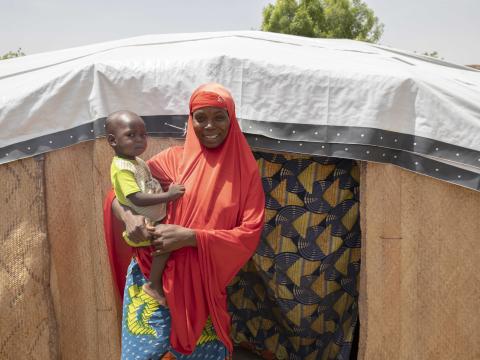Over 4,700 mothers and caregivers benefit from trainings to curb undernourishment and malnutrition in Maradi

A sufficient and balanced diet protects children under five against undernourishment and malnutrition. Children who do not benefit from essential nutrients may suffer from malnutrition and be exposed to serious health problems that could hinder their development; these include growth and intellectual development, a weakened immune system, and increased exposure to diseases like pneumonia, diarrhoea, malaria, and measles in the poorest regions of Niger.
Maradi has become an unsafe region due to its close proximity to the northern Nigeria border. Several families like that of Ouwani, who already had difficulties to feed themselves, welcome refugees who fled their villages to take refuge in Niger. Ouwani is a mother of four, and shares about how this situation has affected her son's health.
She narrates: ‘’My name is Ouwani Abdou; I'm 30 years old and have four children. My husband and I hosted 22 refugees who were attacked in their country and lost all of their belongings. But even before the arrival of refugees, we already had a problem to feed ourselves. My husband has to work in people's farms to find us something to eat because he does not have any field nor animals to raise. The only meal we had was millet-based porridge that we drink all day long, so with the arrival of refugees, we had to share our meal with them. The situation has worsened; there have been days when we don’t get food. Thus, we have decided that every morning, everyone will go on his own to look for food. If my husband manages to gain a lot, we share it. Otherwise, everyone is forced to cope on their own."
"Because of food insufficiency, my two-year-old son became malnourished. He had diarrhoea and was vomiting. I was so sad and afraid but I had no choice but to continue giving him that millet-based porridge. Can you imagine being in this mother shoes? How heart-breaking it can be if you have to give the same food every day to your child and see him getting sick in front of your eyes!" adds Ouwani with sadness.
She adds: ‘’One day, our community health worker informed me that there were going to be trainings in how to treat our children from malnutrition. When I attended the training, I learnt how to measure my children's weight so that if they are malnourished I can bring them to the health centre. I also learnt how to cook different sorts of porridge. What is interesting is that enriched sorts of porridge are easy to make; the cereals used to prepare them are local and easily accessible. When I when back home, I began to practice what I learnt and gradually I saw a change on my child's face. Now my son has recovered from malnutrition; he is healthy! I thank this project, and may God bless it.’’
Amadou Abdoulhayou, a nurse at Dan Kano health centre in Maradi, shares: ‘’Before, I could consult 120 malnourished children per month. I was so overloaded by this activity, I did not even have time to stay with my family or play with my children. I'm really grateful for the recruitment of community health workers which was done at community level, but also trainings given to women which allow them to weigh their children themselves and to take care of them. I have noticed a great decrease in malnutrition, which has happened thanks to the activities that community health workers carried out in communities.’’
With the support of Aktion Deutschland Hilft (ADH), World Vision has trained 20 community health workers in rapid and early detection of malnutrition. In turn, these health workers also trained 4,733 mothers or caregivers, including Ouwani, at the community level. Mothers have also benefited from culinary demonstrations based on locally-available foods covering the minimum acceptable diet of a child, using a technical guide to the national recipe booklet validated by the Niger Government's nutrition department.